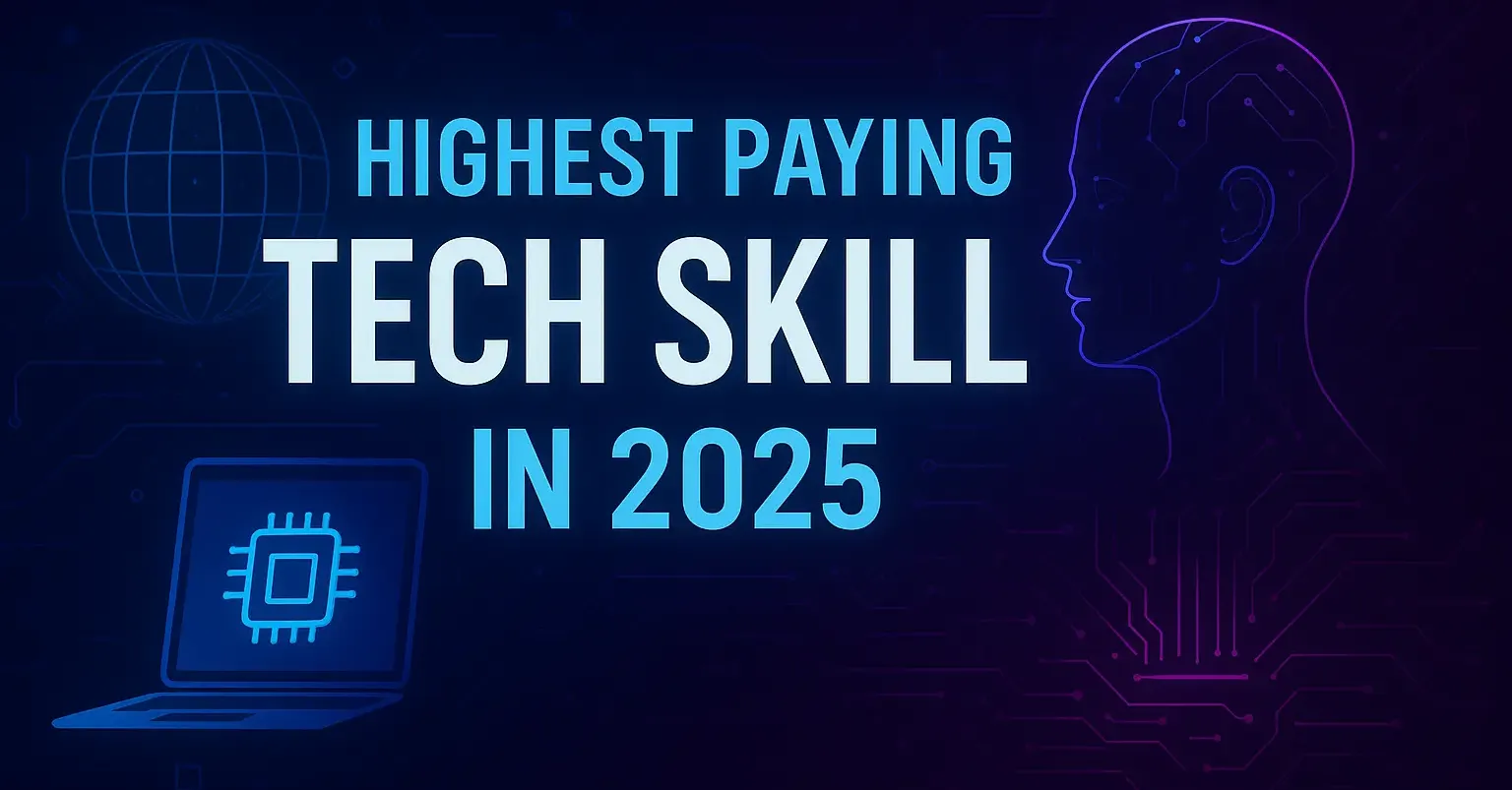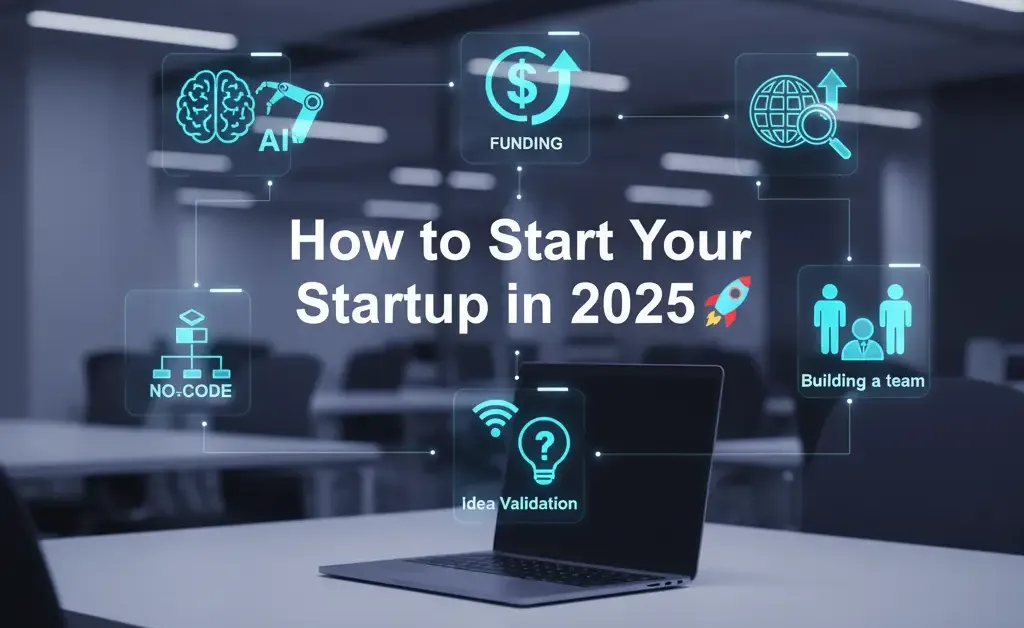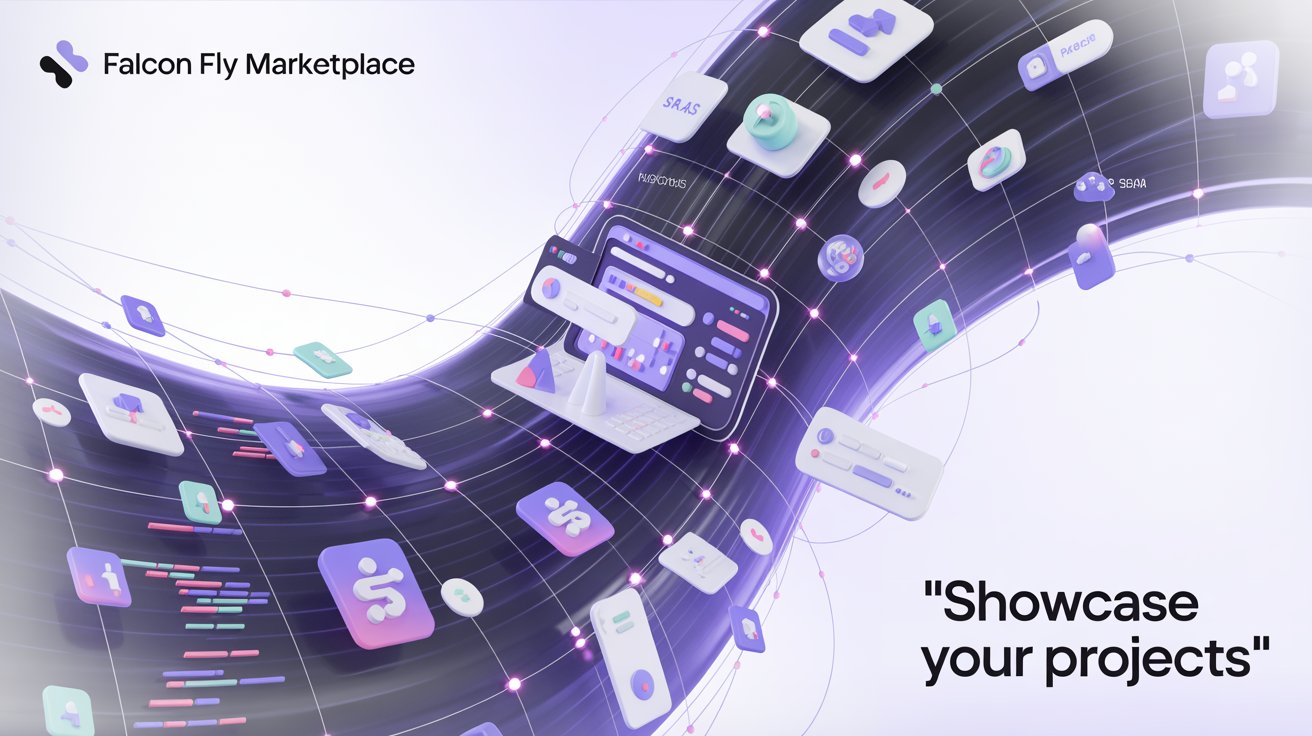The tech industry is a dynamic landscape, and staying ahead of the curve is crucial for career success. In 2025, the demand for specialized, high-impact skills is greater than ever. With the rapid acceleration of AI, automation, and digital transformation, companies are not just looking for coders; they're looking for problem-solvers who can navigate complex challenges and drive innovation.
But if you're looking to maximize your earning potential, which skills should you focus on?
This guide breaks down the most lucrative tech skills of 2025, explaining why they're so valuable, how they're used in the real world, and providing a clear, actionable roadmap to help you learn them and position yourself for a high-paying role.
1. Artificial Intelligence (AI) & Machine Learning (ML)
What It Is: AI is the field of computer science that gives machines the ability to "think" and perform tasks that typically require human intelligence, such as recognizing speech or making decisions. Machine Learning, a crucial subset of AI, involves training systems to learn from data to improve their performance over time without being explicitly programmed.
Why It's a Top Earner: AI is no longer a futuristic concept—it's the engine of modern business. From generative AI models like ChatGPT that create content to predictive analytics that forecast market trends, AI is integrated into nearly every industry. Companies are willing to pay a premium for experts who can design, train, and deploy these complex systems to gain a competitive edge.
Average Salary (2025): $140,000 – $200,000+
Key Roles: AI Engineer, Machine Learning Scientist, Prompt Engineer, AI Product Manager.
How to Learn It:
Foundation: Master Python, the leading language for AI and ML. Key libraries include TensorFlow and PyTorch.
Hands-On Learning: Practice is everything. Build a portfolio of real-world projects like a simple chatbot, a recommendation engine, or an image recognition tool. Platforms like Kaggle offer a wealth of public datasets and competitions to hone your skills.
Certifications: Consider a professional certification to validate your expertise. The Google Cloud AI Engineer or the TensorFlow Developer Certificate are excellent choices.
Resources:
Courses: Coursera's AI for Everyone by Andrew Ng (Beginner), DeepLearning.AI (Advanced).
Tutorials: Hugging Face's tutorials on Transformers for generative AI.
Communities: Join forums on Reddit like r/MachineLearning and follow key AI researchers on LinkedIn.
2. Cybersecurity & Ethical Hacking
What It Is: Cybersecurity is the practice of protecting systems, networks, and data from digital threats. Ethical hacking is a legal and authorized form of hacking where security professionals intentionally test systems to identify and fix vulnerabilities before malicious attackers can exploit them.
Why It's a Top Earner: With sensitive data moving to the cloud and a new wave of threats emerging from AI, the cost of cybercrime is staggering. Companies are investing heavily in a robust defense. A skilled cybersecurity professional or ethical hacker is an invaluable asset, safeguarding a company’s reputation, finances, and customer trust.
Average Salary (2025): $120,000 – $180,000+
Key Roles: Cybersecurity Engineer, Ethical Hacker, Cloud Security Specialist, Chief Information Security Officer (CISO).
How to Learn It:
Foundation: Get a strong grasp of networking, operating systems (Linux is essential), and programming fundamentals.
Certifications: Certifications are highly valued in this field. Start with the CompTIA Security+ for fundamentals, then move to more advanced ones like Certified Ethical Hacker (CEH) or CISSP (Certified Information Systems Security Professional).
Hands-On Learning: Practice penetration testing in a controlled, legal environment. Platforms like Hack The Box and TryHackMe offer gamified, realistic scenarios to build your skills.
Resources:
Platforms: TryHackMe, Hack The Box.
Courses: EC-Council's Certified Ethical Hacker (CEH) course.
Tooling: Learn to use tools like Kali Linux, Wireshark, and Metasploit.
3. Cloud Computing & DevOps
What It Is: Cloud computing enables businesses to access scalable resources—like servers, storage, and databases—over the internet. DevOps is a set of practices that unites software development and IT operations to shorten the development lifecycle and ensure continuous delivery of high-quality software.
Why It's a Top Earner: The global migration to the cloud is a massive trend. Businesses of all sizes are leveraging platforms like AWS, Microsoft Azure, and Google Cloud to reduce costs, improve scalability, and increase agility. Professionals who can manage this infrastructure and automate development pipelines are in extremely high demand.
Average Salary (2025): $115,000 – $170,000+
Key Roles: Cloud Architect, DevOps Engineer, Site Reliability Engineer (SRE).
How to Learn It:
Foundation: Get a free-tier account on a cloud provider like AWS, Azure, or Google Cloud Platform (GCP) and start experimenting.
Tools: Master key DevOps tools: Docker for containerization, Kubernetes for container orchestration, and Terraform for infrastructure as code.
Certifications: Certifications from the major cloud providers are gold. Start with AWS Certified Solutions Architect – Associate or Microsoft Certified: Azure Administrator Associate.
Resources:
Courses: A Cloud Guru, Udemy's DevOps courses.
Documentation: The official documentation from AWS, Azure, and GCP are invaluable learning tools.
4. Data Science & Data Engineering
What It Is: Data Science is the multidisciplinary field of analyzing and interpreting complex datasets to uncover hidden patterns and insights. Data Engineering, on the other hand, is the foundational work of building the robust pipelines and infrastructure that make this analysis possible.
Why It's a Top Earner: In a data-driven world, companies that can effectively leverage their information have a huge advantage. Data scientists and data engineers are the architects behind this process, enabling everything from personalized marketing campaigns to advanced business intelligence.
Average Salary (2025): $110,000 – $160,000+
Key Roles: Data Scientist, Data Engineer, Business Intelligence Analyst, Analytics Engineer.
How to Learn It:
Foundation: Learn SQL for database querying, Python or R for statistical analysis, and master data manipulation libraries like Pandas and NumPy.
Tools: Get comfortable with big data frameworks like Apache Spark and master data visualization tools such as Tableau or Power BI.
Projects: Work on real datasets. Sites like Kaggle are perfect for this. Building a recommendation engine or a predictive model will prove your skills to employers.
Resources:
Platforms: Kaggle, Coursera's Data Science Specializations.
Guides: The Data Science Handbook.
5. Blockchain & Web3 Development
What It Is: Blockchain is a decentralized, distributed digital ledger technology that securely records transactions. Web3 refers to the next evolution of the internet, where users have more control over their data and digital assets, built on the principles of decentralization and blockchain.
Why It's a Top Earner: While crypto markets have seen their share of volatility, the underlying blockchain technology is expanding into new, high-growth sectors like decentralized finance (DeFi), supply chain management, and digital identity. As the demand for decentralized applications (dApps) grows, so does the need for skilled developers.
Average Salary (2025): $100,000 – $150,000+
Key Roles: Blockchain Developer, Smart Contract Engineer, Web3 Architect.
How to Learn It:
Foundation: Start with the fundamentals of blockchain technology. Then, learn a smart contract language like Solidity (for Ethereum) or Rust (for Solana).
Projects: The best way to learn is by building. Create a simple dApp, an NFT project, or a DeFi protocol.
Resources:
Tutorials: Dapp University on YouTube, Ethereum's official documentation.
Platforms: OpenSea Developer Docs, Alchemy University.
6. Product Management with Tech Expertise
What It Is: Product Management is the art of guiding a product from concept to launch, ensuring it meets both customer needs and business goals. Technical Product Managers are a special breed, combining business strategy with a deep understanding of the underlying technology, including AI, cloud, and SaaS.
Why It's a Top Earner: Technical Product Managers are the bridge between engineering teams and business leadership. They can articulate a vision to the C-suite and then dive into a technical conversation with developers. This unique blend of skills is extremely valuable, making them a critical hire for any tech company.
Average Salary (2025): $120,000 – $160,000+
Key Roles: AI Product Manager, SaaS Product Owner, Technical Product Manager.
How to Learn It:
Foundation: Gain a solid understanding of software development lifecycle (SDLC) methodologies like Agile and Scrum.
Skills: Focus on developing soft skills like communication, leadership, and problem-solving, which are just as important as technical knowledge.
Experience: The best way to get started is by getting hands-on experience, whether through an entry-level role or by building your own side project.
Resources:
Certifications: Certified Scrum Product Owner (CSPO) from Scrum Alliance.
Courses: Product Management by Coursera.
Blogs: Product Hunt, Mind the Product.
7. Extended Reality (AR/VR) & Metaverse Development
What It Is: Extended Reality (XR) is an umbrella term that covers Virtual Reality (VR), Augmented Reality (AR), and Mixed Reality (MR). These technologies are the building blocks of the Metaverse, creating immersive digital spaces for work, entertainment, and education.
Why It's a Top Earner: As major tech companies like Apple, Meta, and Microsoft double down on immersive technologies, the demand for developers who can build for these platforms is skyrocketing. From virtual try-ons for retail to surgical training in healthcare, the applications for XR are expanding far beyond just gaming.
Average Salary (2025): $95,000 – $140,000+
Key Roles: AR/VR Developer, 3D Experience Designer, XR Engineer.
How to Learn It:
Foundation: Learn game development engines like Unity or Unreal Engine, which are the industry standards for XR development.
Skills: Get comfortable with 3D modeling and design using software like Blender.
Projects: Build a simple AR filter for Instagram or a small VR experience for a headset to showcase your skills.
Resources:
Engines: Unity Learn, Unreal Engine Learning.
Platforms: ARKit (iOS) and ARCore (Android).
Final Thoughts: Which Skill Should You Choose?
While chasing the highest-paying skill can be tempting, the best strategy is to align your career with a field that genuinely excites you. Passion is the fuel for continuous learning, and in the ever-evolving tech world, continuous learning is the key to long-term success.
Start Small: Don't try to learn everything at once. Pick one skill and build a small side project.
Show, Don't Just Tell: Employers value proof of work. Your portfolio of personal projects will speak volumes.
Network: Join online communities, attend virtual conferences, and connect with people in your chosen field. The right connections can open doors you never knew existed.
By choosing a skill that aligns with your interests and the future of technology, you can build a career that is not only financially rewarding but also deeply fulfilling.


